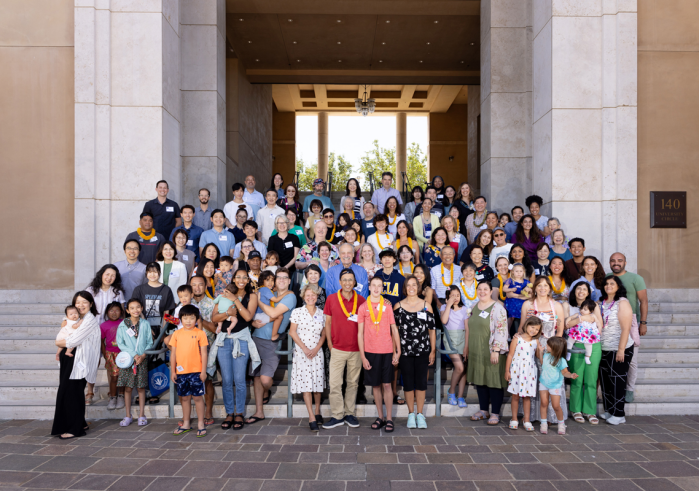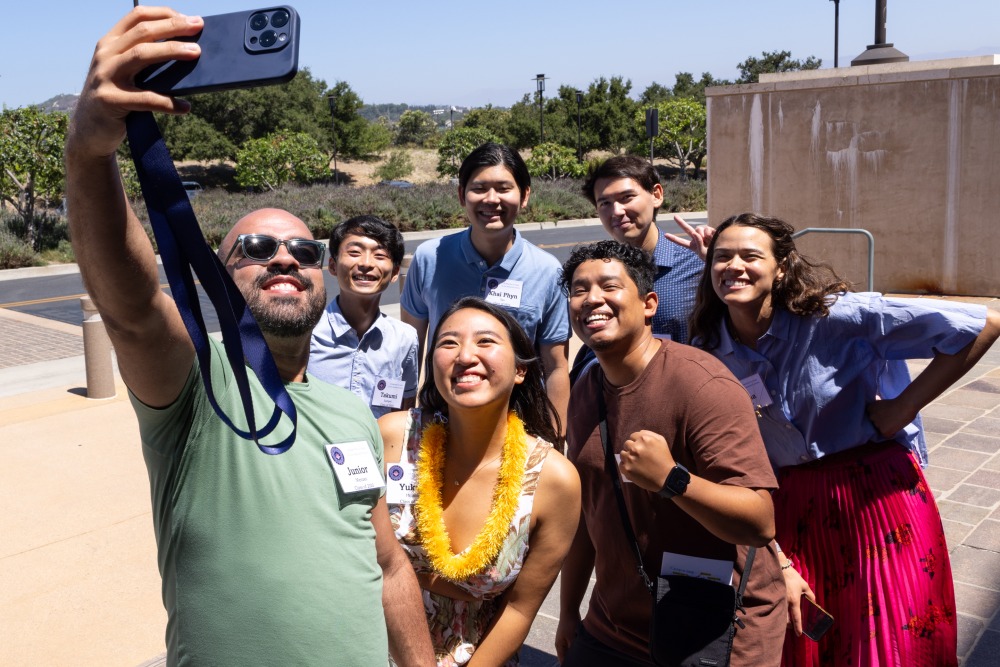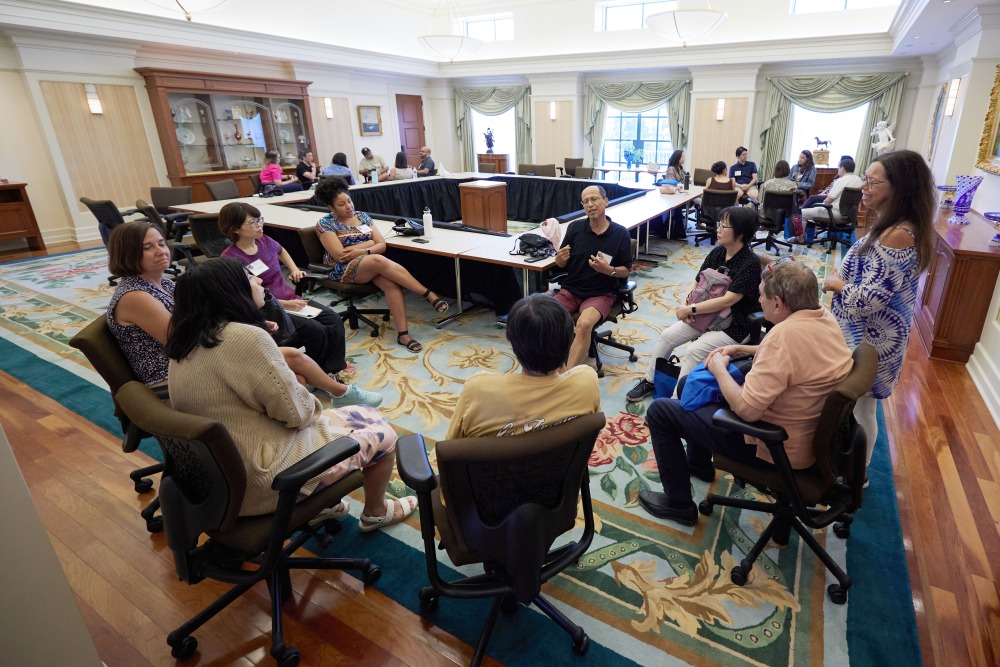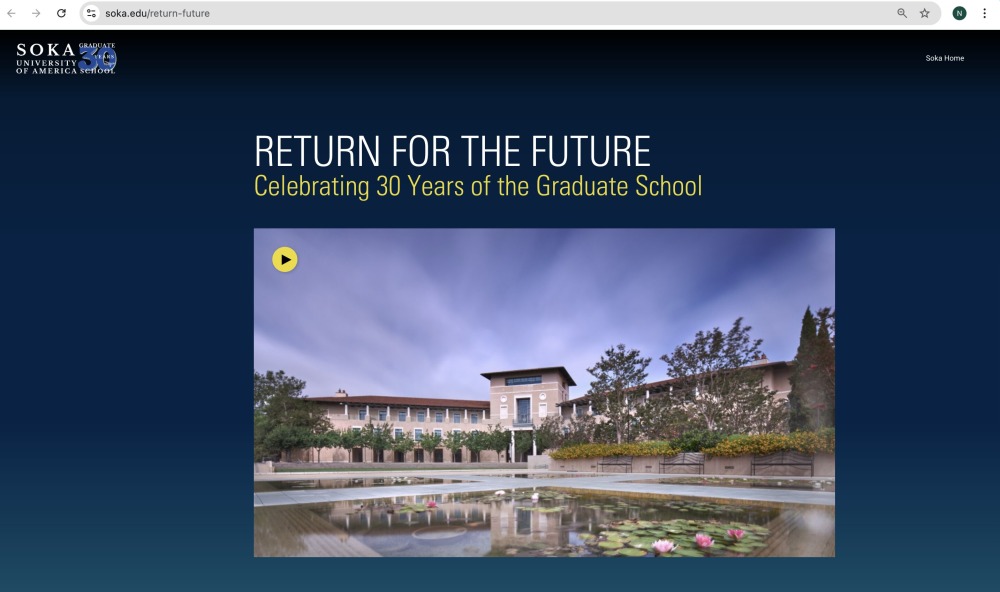Celebrating 30 Years of Impact: Soka Graduate School Reunion Gathers Alumni From Around the World

On a crisp autumn day in 1950, Josei Toda revealed his vision for a university rooted in the principles of value-creating education to his 22-year-old protégé, Daisaku Ikeda.
Thirty-seven years after that conversation, Soka University Los Angeles, a branch campus of Soka University in Japan, opened in Calabasas with the goal of developing into an independent university. After receiving degree-granting approval from the state of California in 1994, the university changed its name to Soka University of America to be distinguished as a freestanding independent institution separate from Soka University in Japan and opened a graduate school.
In the three decades since, Soka Graduate School has graduated more than 150 students from around the world. It has offered an M.A. program in Second and Foreign Language Education; held more than 50 speaking engagements in the “Human Rights Lecture Series,” including Coretta Scott King, Arun Gandhi, and Dr. Cornel West; rolled out the University Bridge Program at the Calabasas campus; and launched a new M.A. program in Educational Leadership and Societal Change.
“Our journey as a university from Calabasas to Aliso Viejo has been guided by the enduring principles of value-creating education practiced by Tsunesaburo Makiguchi, Josei Toda, and Daisaku Ikeda,” SUA President Ed Feasel said in a message commemorating the anniversary. “Their commitment to fostering global citizens who advance peace, uphold human rights, and champion the dignity of life continues to guide our mission today.”
In celebration of the Graduate School’s growth and accomplishments and to recommit to its founding principles, more than 120 Graduate School Alumni Association (Soseikai) members and their families gathered at SUA from July 26-29 under the theme “Return for the Future: Connect with the Values of Soka.” Spanning the classes of 1995 to 2024, the 30th anniversary celebration and reunion included Soseikai members who traveled from around the world to participate, including from Brazil, Israel, and Russia.
Building Bonds Across Generations
The Soseikai board of representatives began the planning process last fall. Through numerous brown-bag lunch meetups, online mixers, and planning meetings, alumni organizers got to know each other and created an atmosphere heading into the reunion that encouraged honest dialogue.
“Creative efforts were made to involve as many alumni as possible, both in preparation and during the reunion, to include and represent diverse voices,” said Hiroko Tomono Furniss M.A. ’96, director of the Ikeda Library at SUA and member of the Soseikai board.
Such efforts include the mentorship program launched by the Soseikai to form new bonds between alumni volunteers and alumni-to-be mentees, along with the decision to make the reunion as inviting and inclusive as possible for the 40 children of alumni who attended, half of whom were teenagers. Although many kids were meeting each other for the first time, they played volleyball, made bracelets, sunbathed by the pool, posed at a photobooth, and marveled at the night sky from the Nieves Observatory. They also enjoyed a campus tour and met with Office of Admission staff, who answered their questions about academics and life on campus.
Forging new connections and reflecting on shared journeys were central themes throughout the reunion. President Feasel, Graduate School Dean Tomoko Takahashi, and mentorship program participants shared inspiring stories from the past and exciting visions for the future during the opening ceremony. Ambassador Anwarul K. Chowdhury sent a heartfelt video recalling the first World Summit of Educators led by the Graduate School classes of 2016 and 2017. The reunion also included small group dialogues where alumni shared personal stories and future hopes, and lightning talks led by alumni on lifelong learning, the balance between nature and humanity, and using social media for global impact.
“The graduate school 30 year reunion was a wonderful opportunity to reconnect with old friends and make new ones,” said Joe Howard M.A. ’95. The word “magical” came up often as alumni reflected on their time together, capturing a feeling that they left the reunion renewed and with a stronger sense of purpose to lead contributive lives in their respective arenas.
Recognizing all the work it required to plan the three-day event, many attendees wrote letters of appreciation to the reunion planners and behind-the-scenes staff. Maria Sanchez M.A. ’06 said the reunion was a beautiful reflection of Ikeda’s vision of nurturing a network of dedicated educators who embody the values of global citizenship.
“I am deeply grateful to everyone who paved the way and to those who organized such a meaningful and heartfelt gathering,” Sanchez said. “I will cherish the inspiring moments shared with my fellow graduates.”
Honoring the Past and Shaping the Future: New 30th Anniversary Exhibit and Website Launch
A new website and panel exhibit also debuted as the reunion was getting underway. The exhibit, which is now viewable in the lobby of the Soka Performing Arts Center, explores the Graduate School’s rich history, its founding principles, and the wide-ranging global impact of Soka education. Through a series of 16 panels, visitors follow the path of SUA’s inception in Calabasas to its development into a leading American institution of higher education that empowers students to excel academically and live contributive lives.
Serving as a digital companion to the exhibit, the 30th anniversary website provides a thoughtful look at the university’s growth and evolution. The site includes a message from President Feasel, a video that walks viewers through key milestones, emphasizing the values of peace, human rights, and the dignity of life that have guided the institution since its founding. An interactive timeline highlights significant events, such as the launch of the Pacific Basin Research Center, the Graduate School’s new M.A. program, and Ikeda’s dialogues with global leaders.
While reflecting on the university’s 30-year commitment to fostering global citizens, both the exhibit and the website reaffirm the principles that will continue to shape its future.



